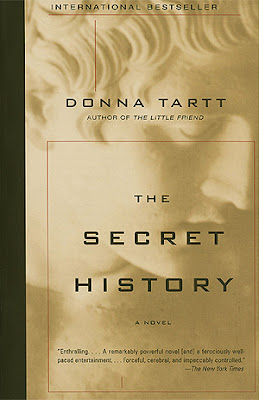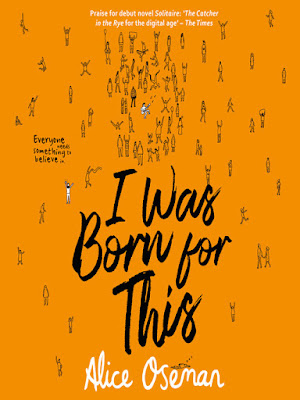Book Review: The Secret History by Donna Tartt
 |
(finished reading 13/08/20)
4.5/5 stars
Dark, intellectual, intricate.
“Does such a thing as 'the fatal flaw,' that showy dark crack running down the middle of a life, exist outside literature? I used to think it didn't. Now I think it does. And I think that mine is this: a morbid longing for the picturesque at all costs.”
The Secret History is told from the perspective of Richard Papen as he recalls his time at Hampden, an elite liberal arts college in Vermont, New England in the 1980s. Under the influence of their charismatic classics’ professor, Richard and his classmates of clever, eccentric misfits discover a way of thinking and living that is a world away from the humdrum existence of their contemporaries. But when they go beyond the boundaries of normal morality they slip gradually from obsession to corruption and betrayal, and at last - inexorably - into evil.
I bought this book many years ago when it was recommended to me, but I admit that whenever I was about to start it, the 600+ pages intimidated me and always felt like a much too big of a commitment. However, I decided to finally get over myself and take the plunge. Although the prologue got me well and truly hooked, I wholeheartedly admit that the 300 pages that followed were a struggle for me. I definitely think that some of this section could be condensed without losing too much. The pace was just a little too slow for my liking. But once I got to the halfway point, I couldn’t put it down. It messed with my mind, I was constantly on edge and I found myself thoroughly enjoying the story unfold. It reminded me a lot of the 2010 British play Posh by Laura Wade and I’m certain this novel must have influenced it.
I loved the classical infusions throughout the book. Particularly the references to beauty and sublimity as this is something that has always fascinated me. I especially loved how so obviously pretentious it was. As someone who has never studied classics or learnt any Latin or Greek, I felt as though the narrator was looking down on me from beginning to end. I would love to reread this book and translate all the Greek and Latin phrases sprinkled throughout just to get an extra layer of meaning from the novel. I know a lot of readers have criticised the novel because of how pretentious it is but I really think this was part of the genius of it. We are made to feel small and stupid in the same way that the main characters make those outside of their circle feel. No matter how much we think we understand the characters, there is always a barrier between us and them.
The structure of the novel itself has said to perfectly reflect that of a Greek tragedy. This seemed obvious from the beginning but only after getting to the end I realised how beautifully crafted the plot is. Although I did find reading the beginning incredibly slow, upon reflection it’s clear this has been done purposefully to mess with the reader’s psychology. From the very first line of the prologue, we know that a murder takes place. This is naturally shocking to the reader and invites us to judge these characters immediately. However, the slow build up forces us to get to know these characters as Richard does so that when we eventually get to the murder itself, we are, like Richard, seemingly unsurprised by what happens. This makes a lot of sense considering the purpose of the story is Richard trying to justify what happened that year for his own sake as much as to convince others.
The characters were especially intriguing. The relationships between them all were so messy and complicated throughout. There was something interesting about each of them that you hated but simultaneously found fascinating. I think this linked to the themes of beauty mentioned throughout. As a reader, we find the characters and events in the story morbid and shocking and yet we can’t put it down, it draws us in just as the group are drawn into their lessons. We even sympathise with Richard even though he consistently lies and his actions (or lack of) are unforgivable. The writing seemed almost biased because it was Richard’s story. He manipulates you into seeing what he wants you to see at each point in the story. This was most prevalent in the contrast between how Bunny’s character is mentioned throughout. For example, before he is killed, we are encouraged to hate him how the others do but, after his death, Richard recounts him as almost charming. Henry’s character is probably the most fascinating; I could certainly write a whole essay analysing him more than any of the others. He reminded me a lot of Phil from Dennis Kelly’s 2008 play DNA because of his uniquely powerful yet cold façade. Again, I am certain that this novel influenced the play because of its thematic similarities. Each character was so beautifully formed and seemingly genuine despite their eccentricity.
The setting of the novel itself was equally well-crafted. I actually had to look up when the novel was supposed to be set as it wasn’t apparent whilst reading it. I suppose when the novel was released in 1992 it would have been fairly obvious that it was set in the 1980s since Richard is presumably looking back on his time at Hampden from the perspective of 1992. But in some sense, the story felt very timeless, it could have easily been earlier or later than this. Hampden town itself felt very vivid and, importantly, the heart of the story. Like Richard, we are fascinated with this strange new place and just as enchanted by its beauty. Hampden College is supposedly based upon Bennington College in Vermont (which Donna Tartt attended) which would certainly explain why it comes across as so genuine. I truly felt transported to the town as the seasons ticked by. There are so many beautiful, almost poetic, descriptions of the scenery. It really gave the novel a softness amongst the sharpness of everything else.
This novel really is nothing like anything I’ve every read. It’s so clever but reads effortlessly. There are so many themes I could unpack and it’s definitely going to leave me thinking about it for a very long time. I am very surprised that there haven’t been any adaptations of the novel. I would really love to see it brought to life in a TV show as it has so much potential with the right director and actors. At times I could almost see it as a stage play because it was so theatrical, but I think you would lose the complexity of it if it were condensed to a play or a film. I would love to read Donna Tartt’s other novels though as her writing is so intricate and unique. Overall, I highly recommend The Secret History. It’s definitely not for everyone, but I’m so grateful to have read it and it is sure to draw me back in the future.



Comments
Post a Comment